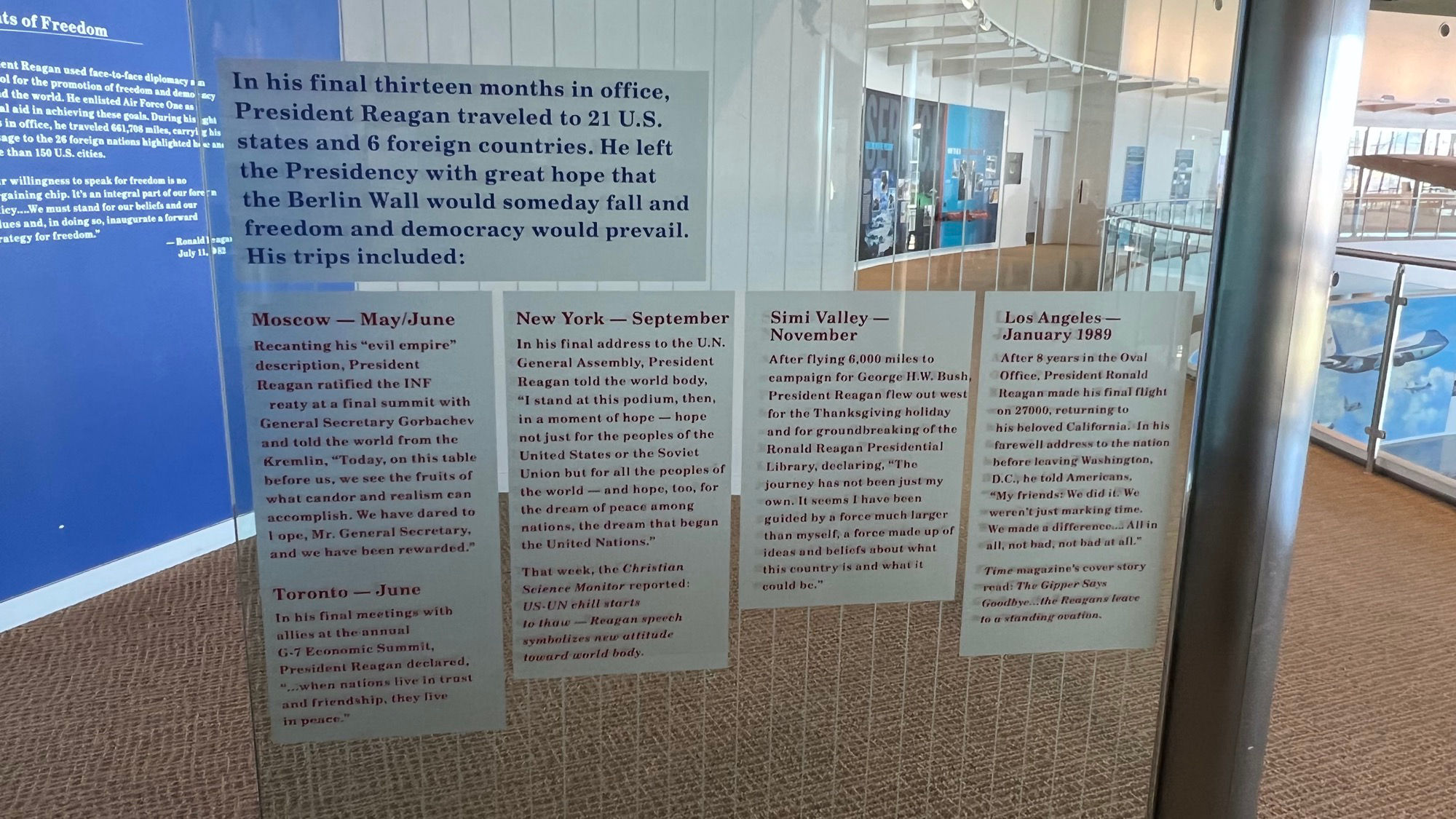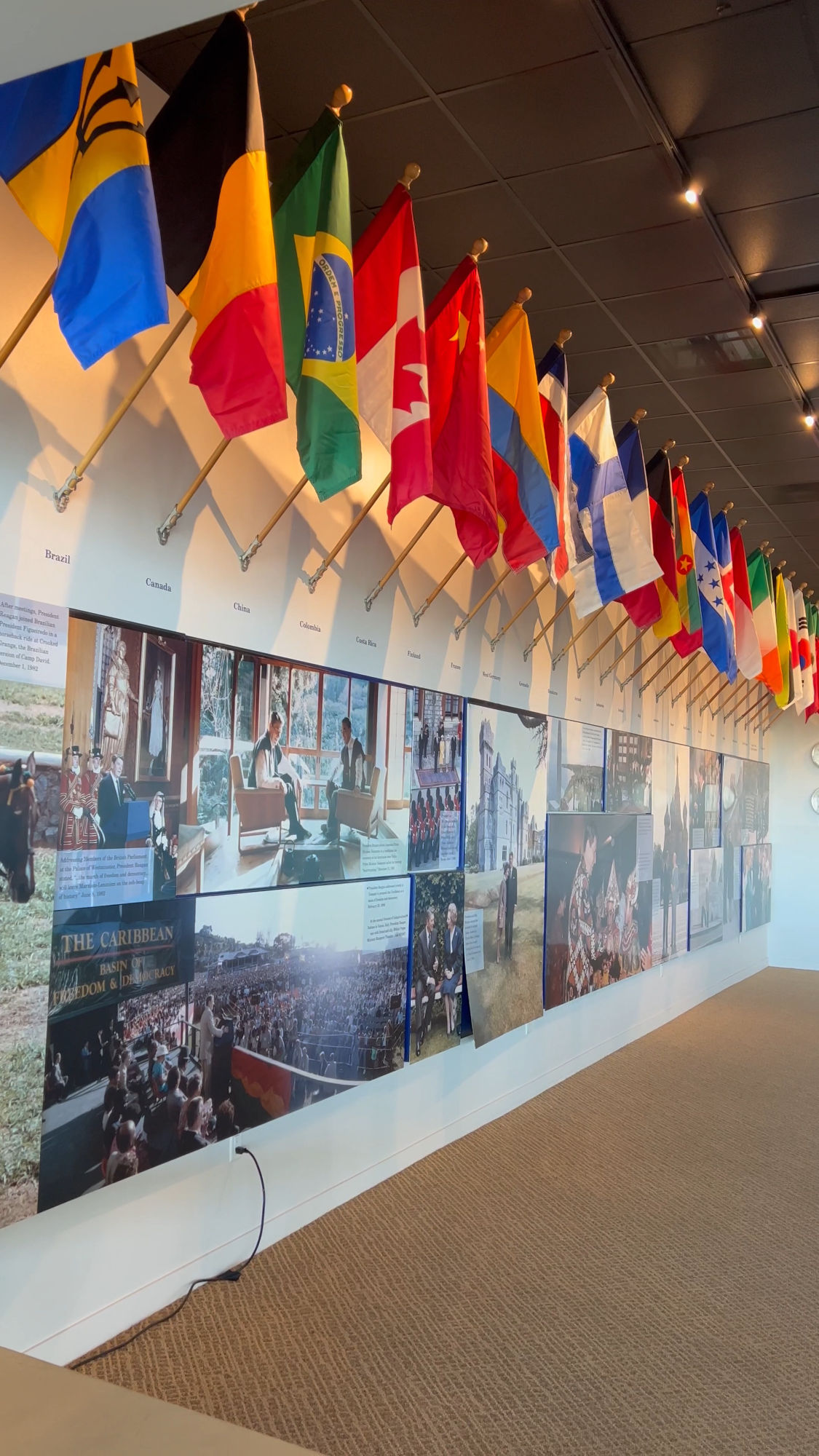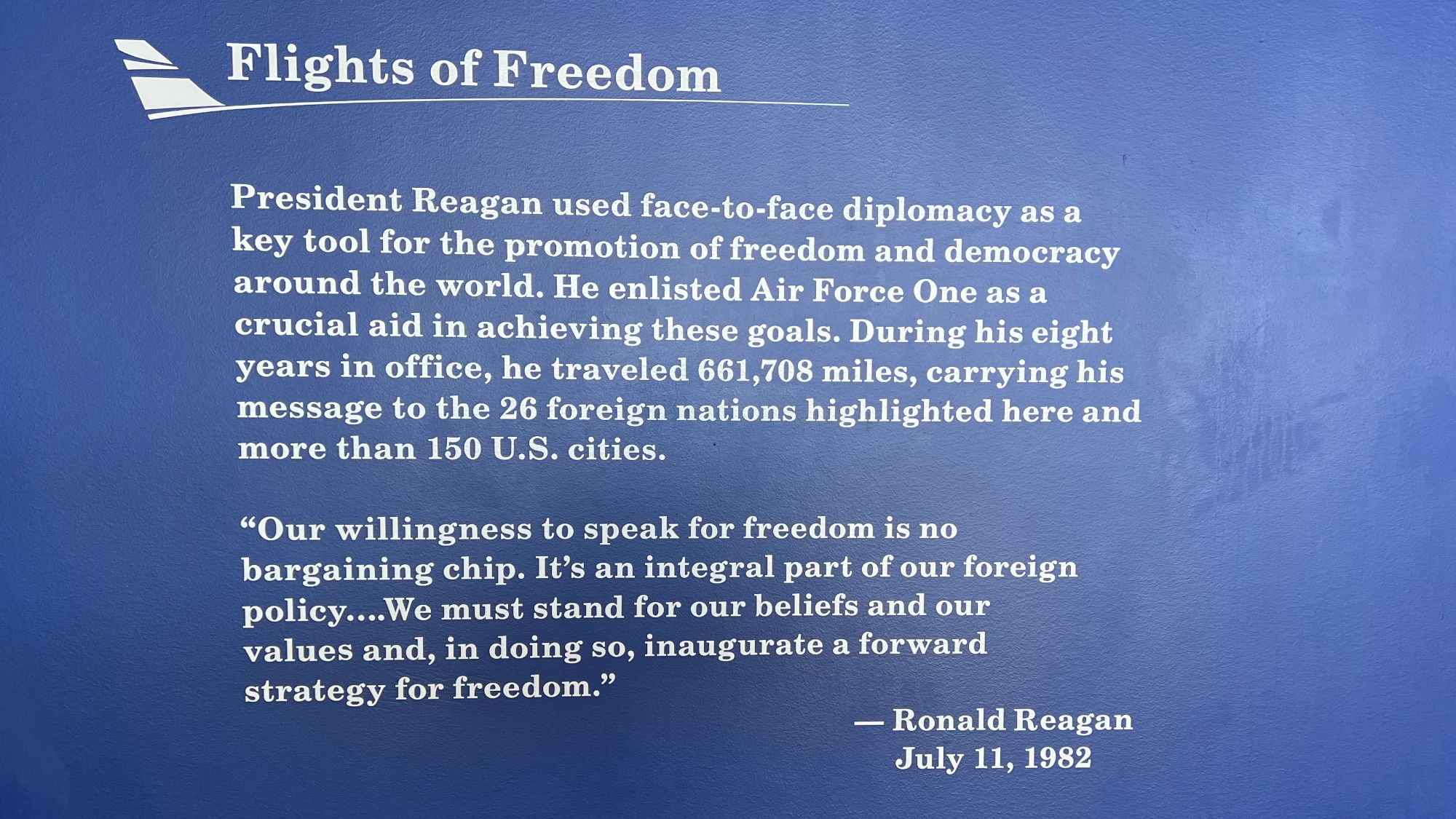
President Reagan used face-to-face diplomacy as a key tool for the promotion of freedom and democracy around the world. He enlisted Air Force One as a crucial aid in achieving these goals. During his eight years in office, he traveled 661,708 miles, carrying his message to the 26 foreign nations highlighted here and more than 150 U.S. cities.
Our willingness to speak for freedom is no bargaining chip. It's an integral part of our foreign policy...We must stand for our beliefs and our values and, in doing so, inaugurate a forward strategy for freedom. July 11, 1982

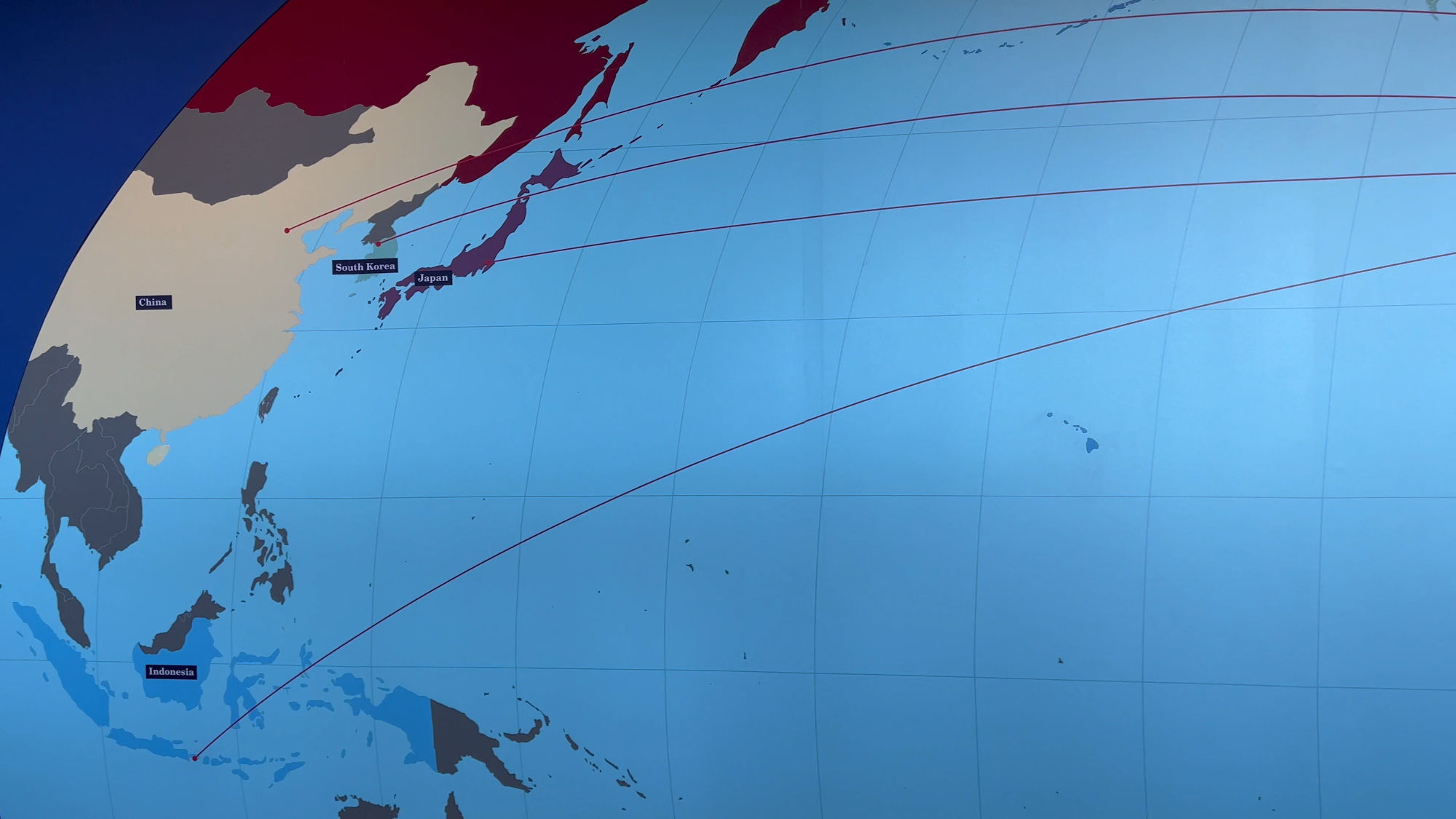
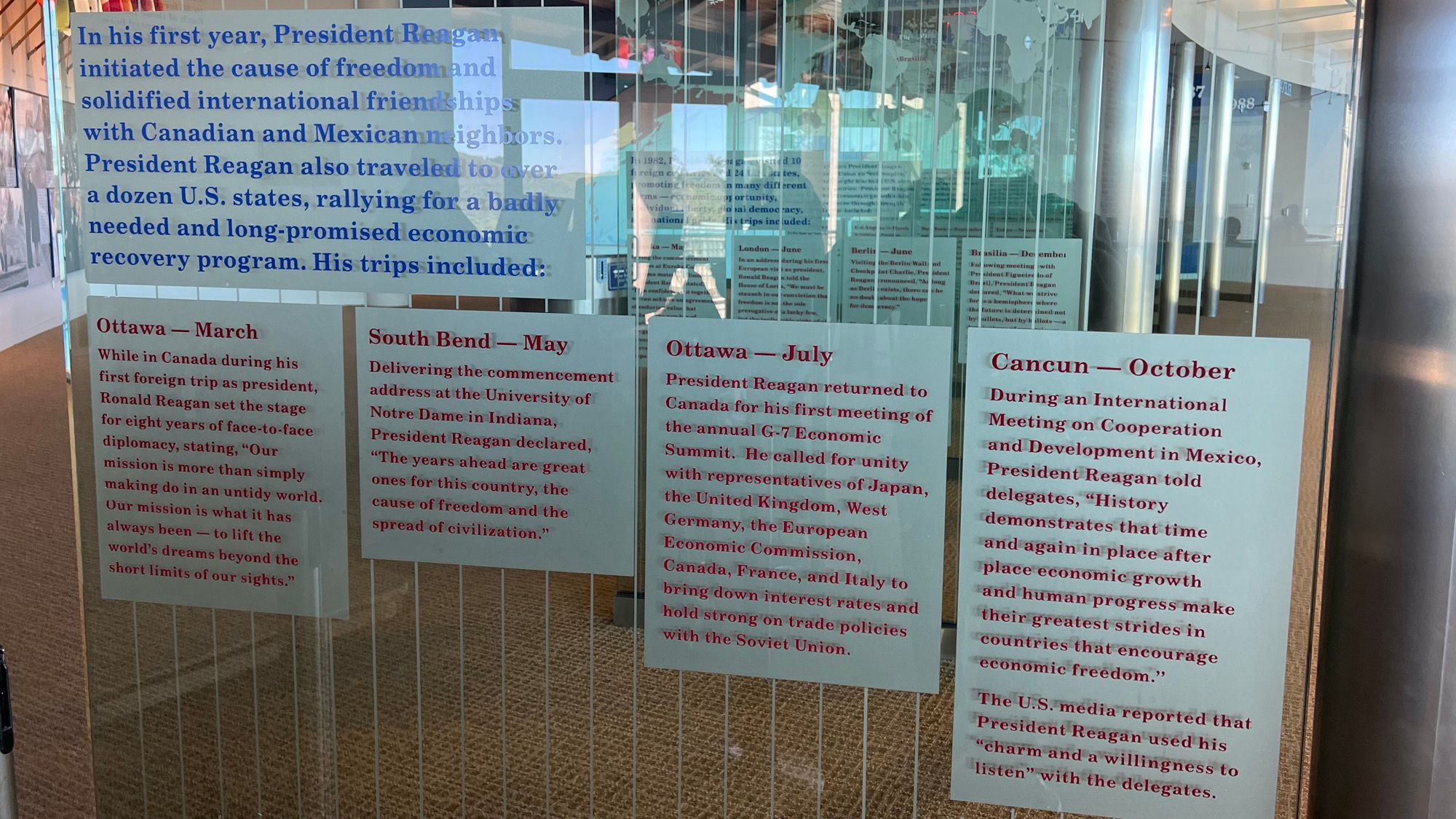
President Reagan initiated the cause of freedom and solidified international friendships with Canadian and Mexican neighbors. President Reagan also traveled to over a dozen U.S. states, rallying for a badly needed and long-promised economic recovery program. His trips included:
- Ottawa - March
While in Canada during his first foreign trip as president, Ronald Reagan set the stage for eight years of face-to-face diplomacy, stating, "Our mission is more than simply making do in an untidy world. Our mission is what it has always been - to lift the world's dreams beyond the short limits of our sights." - South Bend - May
Delivering the commencement address at the University of Notre Dame in Indiana, President Reagan declared, "The years ahead are great ones for this country, the cause of freedom and the spread of civilization." - Ottawa - July
President Reagan returned to Canada for his first meeting of the annual G-7 Economic Summit. He called for unity with representatives of Japan, the United Kingdom, West Germany, the European Economic Commission, Canada, France, and Italy to bring down interest rates and hold strong on trade policies with the Soviet Union. - Cancun - October
During an International Meeting on Cooperation and Development in Mexico, President Reagan told delegates, "History demonstrates that time and again in place after place economic growth and human progress make their greatest strides in countries that encourage economic freedom."The US media reported that President Reagan used his "charm and a willingness to listen" with the delegates.
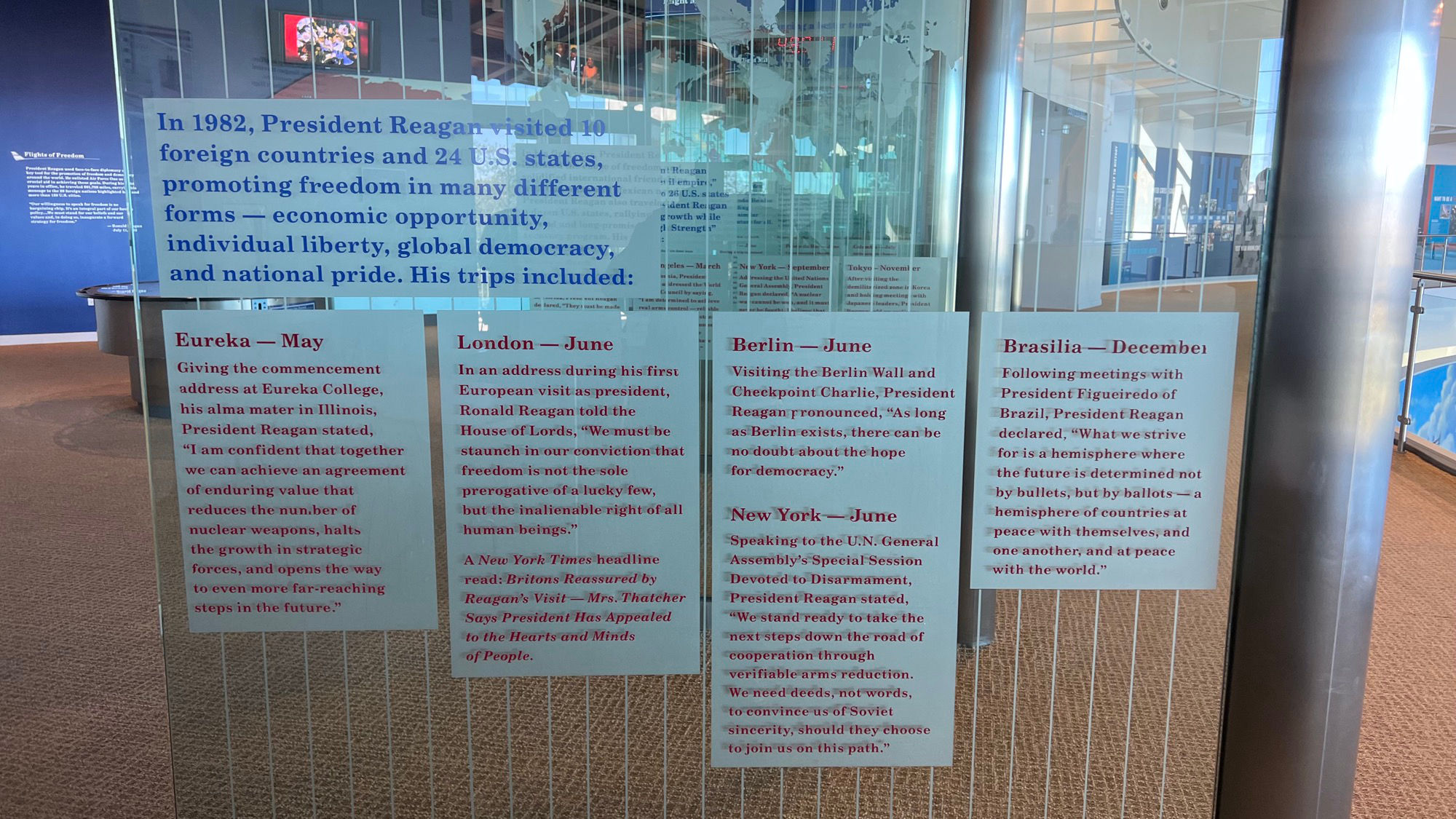
In 1982, President Reagan visited 10 foreign countries and 24 U.S. states, promoting freedom in many different forms - economic opportunity, individual liberty, global democracy, and national pride. His trips included:
- Eureka - May
Giving the commencement address at Eureka College, his alma mater in Illinois, President Reagan stated, "I am confident that together we can achieve an agreement of enduring value that reduces the number of nuclear weapons, halts the growth in strategic forces, and opens the way to even more far-reaching steps in the future. - London - June
In an address during his first European visit as president, Ronald Reagan told the House of Lords, "We must be staunch in our conviction that freedom is not the sole prerogative of a lucky few, but the inalienable right of all human beings."A New York Times headline read: Britons Reassured by Reagan's Visit - Mrs. Thatcher Says President Has Appealed to the Hearts aid Minds of People.
- Berlin - June
Visiting the Berlin Wall and Checkpoint Charlie, President Reagan pronounced, "As long as Berlin exists, there can be no doubt about the hope for democracy." - New York - June
Speaking to the U.N. General Assembly's Special Session Devoted to Disarmament, President Reagan stated, "We stand ready to take the next steps down the road or cooperation through verifiable arms reduction. We need deeds, not words, to convince us of Soviet sincerity, should they choose to join us on this path." - Brasilia - December
Following meetings with President Figueiredo of Brazil, President Reagan declared, "What we strive for is a hemisphere where the future is determined not by bullets, but by ballots - a hemisphere of countries at peace with themselves, and one another, and at peace with the world."

In the year in which President Reagan called the Soviet Union an "evil empire," Air Force One brought him to 26 U.S. states and 3 foreign countries. President Reagan promoted job and economic growth while advancing his "Peace through Strength" initiative. His trips included:
- Orlando — March
In his famous "evil empire" speech to the National Association of Evangelicals in Florida, President Reagan declared, "They must be made to understand we will never compromise our principles and standards. We will never give away our freedom. We will never abandon our belief in God. And we will never stop searching for a genuine peace." - Los Angeles - March
In California, President Reagan addressed the World Affairs Council by saying, "I am determined to achieve real arms control - reliable agreements that will stand the test of time, not cosmetic agreements that raise expectations only to have hopes cruelly dashed." - New York - September
Addressing the United Nations General Assembly, President Reagan declared, "A nuclear war cannot be won, and it must never be fought. I believe that if governments are determined to deter and prevent war, there will not be war." - Tokyo - November
After visiting the demilitarized zone in Korea and holding meetings with Japanese leaders, President Reagan told an audience, "The true division in the world today is not between east and west, but between progress and stagnation, between freedom and oppression, between hope and despair."
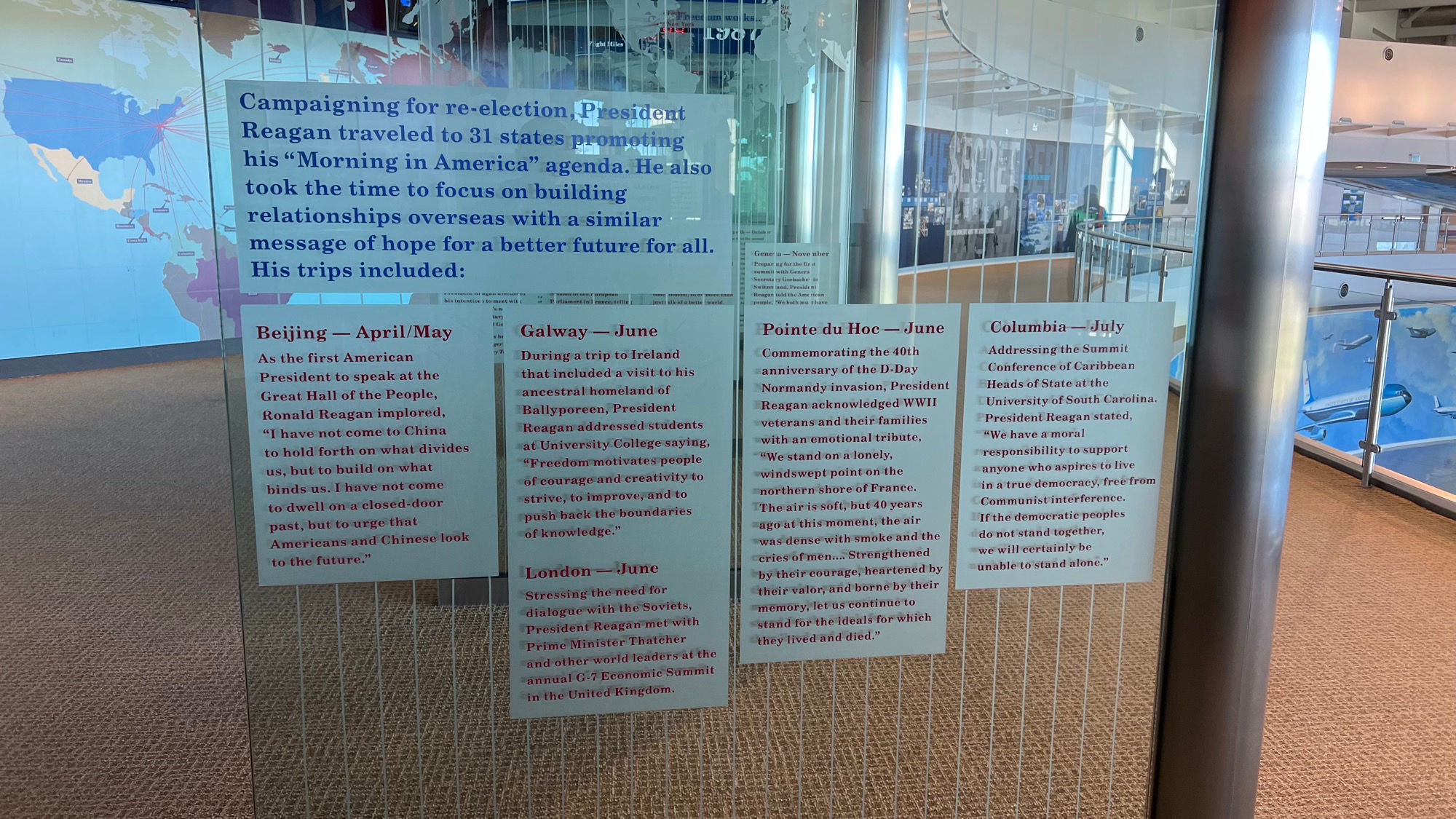
Campaigning for re-election, President Reagan traveled to 31 states promoting his "Morning in America" agenda. He also took the time to focus on building relationships overseas with a similar message of hope for a better future for all. His trips included:
- Beijing - April/May
As the first American President to speak at the Great Hall of the People, Ronald Reagan implored, "I have not come to China to hold forth on what divides us, but to build on what binds us. I have not come to dwell on a closed-door past, but to urge that Americans and Chinese look to the future." - Galway - June
During a trip to Ireland that included a visit to his ancestral homeland of Ballyporeen, President Reagan addressed students at University College saying, "Freedom motivates people of courage and creativity to strive, to improve, and to push back the boundaries of knowledge." - London - June
Stressing the need for dialogue with the Soviets, President Reagan met with Prime Minister Thatcher and other world leaders at the annual G-7 Economic Summit in the United Kingdom. - Pointe du Hoc - June
Commemorating the 40th anniversary of the D- Day Normandy invasion, President Reagan acknowledged WWII veterans and their families with an emotional tribute, "We stand on a lonely, windswept point on the northern shore of France. The air is soft, but 40 years ago at this moment, the air was dense with smoke and the cries of men... Strengthened by their courage, heartened by their valor, and borne by their memory, let us continue to stand for the ideals for which they lived and died." - Columbia - July
Addressing the Summit Conference of Caribbean Heads of State at the University of South Carolina. President Reagan stated, "We have amoral responsibility to support anyone who aspires to live in a true democracy, free from Communist interference. If the democratic peoples do not stand together. we will certainly be unable to stand alone."

Following a landslide re-election, President Reagan championed long-held beliefs that the two world superpowers could look towards a future with optimism. Advocating the need for face-to-face diplomacy in visits to 7 foreign countries and 19 U.S. states, 1985 began a new era in U.S. Soviet relations. His trips included:
- Quebec - March
In meetings with Prime Minister Brian Mulroney during the "Shamrock Summit" in Canada, President Reagan discussed his intentions to meet with the Soviet Union's newly appointed Secretary General, Mikhail Gorbachev.A New York Times headline read: Reagan Eager for a Summit, Mulroney Told.
- Strasbourg - May
During a strategically significant visit with European allies, President Reagan addressed a Special Session of the European Parliament in France, telling them, "We're at your side today, because, like you, we have not veered from the ideals of the West - the ideals of freedom, liberty, and peace. Let no one - no one - doubt our purpose." - New York - October
Speaking to the U.N. General Assembly on its 40th anniversary, President Reagan bid for peace, "It is time, indeed, to do more than just talk of a better world. It is time to act. And we will act when nations cease to try to impose their ways upon others. And we will act when they realize that we, for whom the achievement of freedom has come dear, will do what we must to preserve it from assault." - Geneva - November
Preparing for the first summit with General Secretary Gorbachev in Switzerland, President Reagan told the American people, "We both must have the same intentions. If he feels as strongly... then we'll endthe arms race."Following the summit, Gorbachev remarked, "We consider an improvement in relations between the Soviet Union and U.S. is now fully possible."
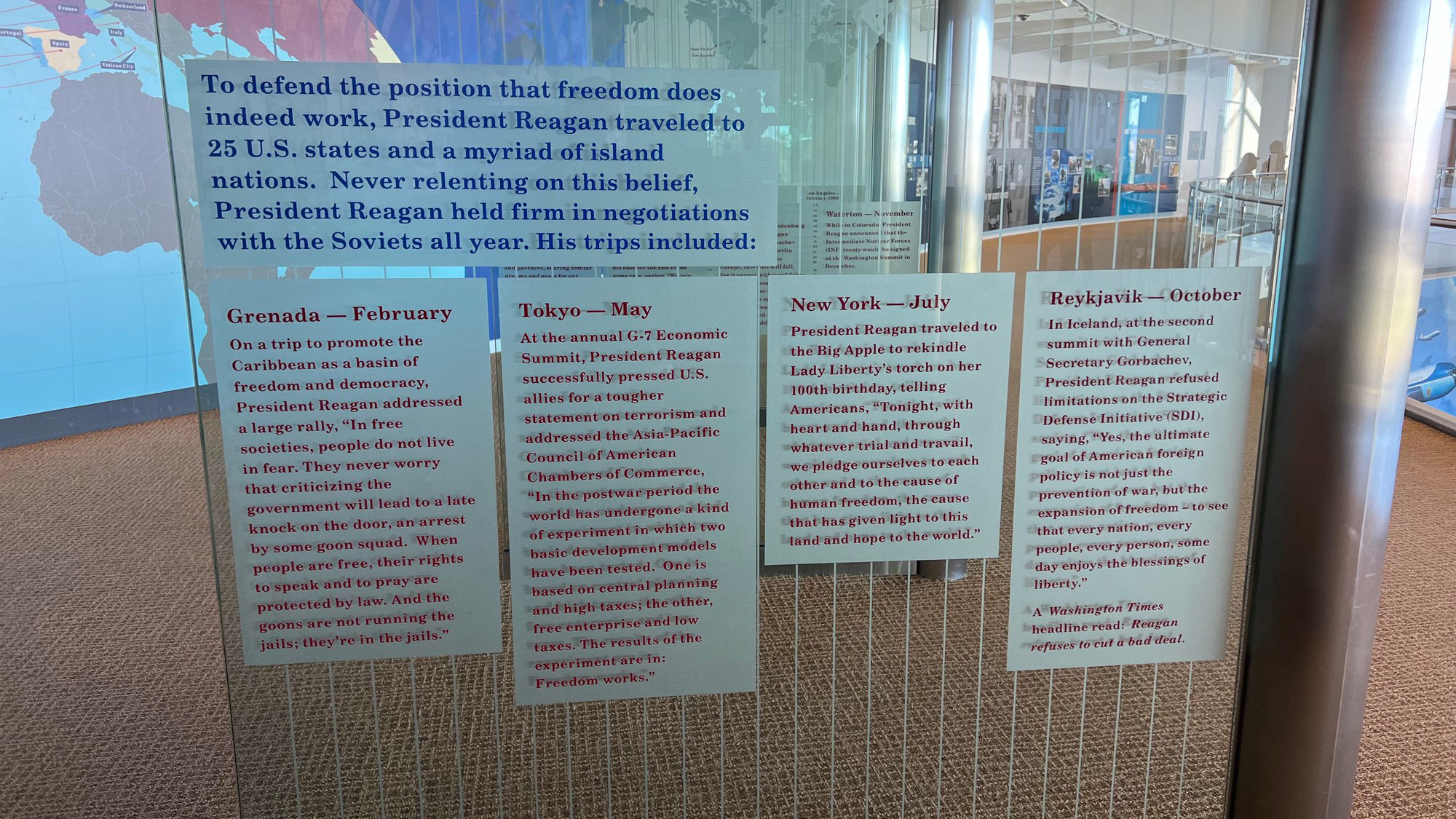
To defend the position that freedom does indeed work, President Reagan traveled to 25 U.S. states and a myriad of island nations. Never relenting on this belief, President Reagan held firm in negotiations with the Soviets all year. His trips included:
- Grenada - February
On a trip to promote the Caribbean as a basin of freedom and democracy, President Reagan addressed a large rally, "In free societies, people do not live in fear. They never worry that criticizing the government will lead to a late knock on the door, an arrest by some goon squad. When people are free, their rights to speak and to pray are protected by law. And the goons are not running the jails; they're in the jails." - Tokyo - May
At the annual G-7 Economic Summit, President Reagan successfully pressed U.S. allies for a tougher statement on terrorism and addressed the Asia-Pacific Council of American Chambers of Commerce, "In the postwar period the world has undergone a kind of experiment in which two basic development models have been tested. One is based on central planning and high taxes, the other, free enterprise and low taxes. The results of the experiment are in: Freedom works." - New York - July
President Reagan traveled to the Big Apple to rekindle Lady Liberty's torch on her 100th birthday, telling Americans, "Tonight, with heart and hand, through whatever trial and travail, we pledge ourselves to each other and to the cause of human freedom, the cause that has given light to this land and hope to the world." - Reykjavik - October
In Iceland, at the second summit with General Secretary Gorbachev, President Reagan refused limitations on the Strategic Defense Initiative (SDI), saying, "Yes, the ultimate goal of American foreign policy is not just the prevention of war, but the expansion of freedom - to see that every nation, every people, every person, some day enjoys the blessings of liberty."A Washington Times headline read: Reagan refuses to cut a bad deal.

Although this year found President Reagan staying closer to the White House, he traveled to 16 U.S. states and 3 foreign countries promoting his message of peace, freedom, and prosperity. At the centerpiece of this agenda, he challenged the Soviet leader to "tear down this wall." His trips included:
- Ottawa - April
President Reagan traveled to Canada to meet with his friend and ally Brian Mulroney saying, "As before, and I hope as always, we come as friends and partners, sharing similar dreams and goals for our people: peace, freedom, and prosperity. And working together, we have gone far toward making those dreams a reality." - Vatican City - June
After a meeting with His Holiness Pope John Paul II that reinforced their friendship and U.S.-Vatican ties, President Reagan made his case for the end of the arms race, saying, "We join with the Holy See in our concern for a world of peace, where armaments are reduced and human rights respected, a world of justice and hope, where each of God's creatures has the means and opportunity to develop to his or her full potential." - Berlin - June
Standing at the Brandenburg Gate, President Reagan challenged Mr. Gorbachev to "tear down" the Berlin Wall saying, "across Europe, this wall will fall. For it cannot withstand faith; it cannot withstand truth. The wall cannot withstand freedom." This speech, one of President Reagan's most famous, marked a turning point in the Cold War. - Waterton - November
While in Colorado, President Reagan announced that the Intermediate Nuclear Forces (INF) treaty would be signed at the Washington Summit in December.The New York Times headline proclaimed: Accord is Reached on Missile Treaty by U.S. and Soviets.

In his final thirteen months in office, President Reagan traveled to 21 U.S. states and 6 foreign countries. He left the Presidency with great hope that the Berlin Wall would someday fall and freedom and democracy would prevail. His trips included:
- Moscow - May/June
Recanting his "evil empire" description, President Reagan ratified the INF Treaty at a final summit with General Secretary Gorbachev and told the world from the Kremlin, "Today, on this table before us, we see the fruits of what candor and realism can accomplish. We have dared to hope, Mr. General Secretary, and we have been rewarded." - Toronto - June
In his final meetings with allies at the annual G-7 Economic Summit, President Reagan declared, "When nations live in trust and friendship, they live in peace." - New York - September
In his final address to the U.N. General Assembly, President Reagan told the world body, "I stand at this podium, then, in a moment of hope - hope not just for the peoples of the United States or the Soviet Union but for all the peoples of the world - and hope, too, for the dream of peace among nations, the dream that began the United Nations."That week, the Christian Science Monitor reported: US-UN chill starts to thaw - Reagan speech symbolizes new attitude toward world body.
- Simi Valley - November
After flying 6,000 miles to campaign for George H.W. Bush, President Reagan flew out west for the Thanksgiving holiday and for groundbreaking of the Ronald Reagan Presidential Library, declaring, "The journey has not been just my own. It seems I have been guided by a force much larger than myself, a force made up of ideas and beliefs about what this country is and what it could be." - Los Angeles - January 1989
After 8 years in the Oval Office, President Ronald Reagan made his final flight on 27000, returning to his beloved California. In his farewell address to the nation before leaving Washington, D.C., he told Americans, "My friends: We did it. We weren't just marking time. We made a difference... All in all, not bad, not bad at all."Time magazine's cover story read: The Gipper Says Goodbye. The Reagan's leave to a standing ovation.
